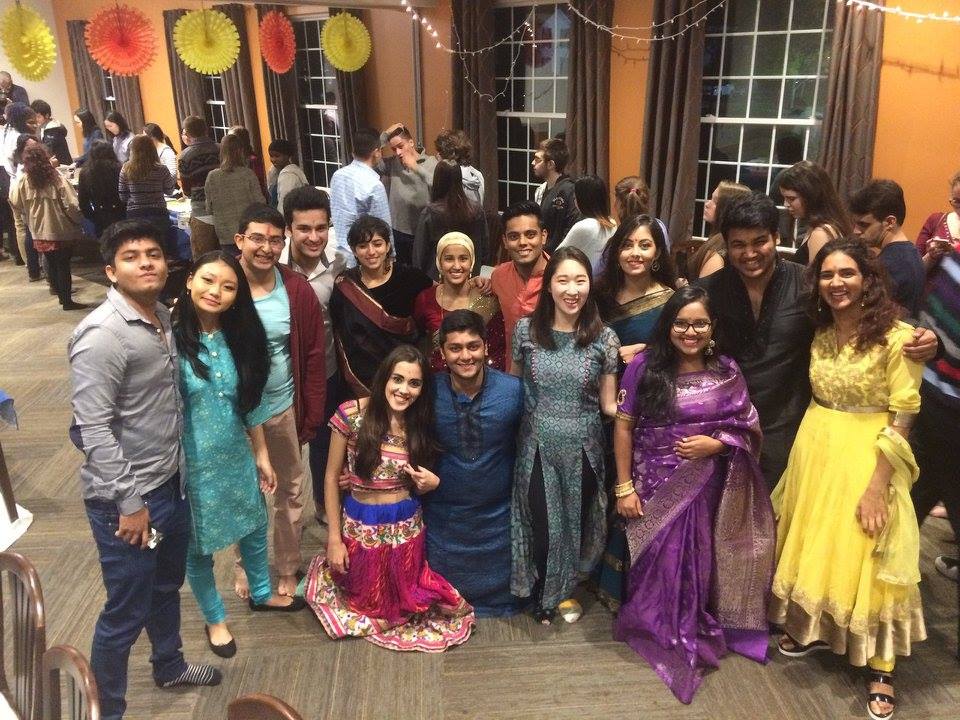Diwali or Deepavali is the annual Hindu festival of lights in honor of Lakshmi, the goddess of fertility and prosperity. This festival signifies the victory of light over darkness and hope over despair. It is celebrated across the world by Hindus, Jains, Sikhs and some Buddhists. Around 60 members of the Wheaton community came together to celebrate Diwali on Nov. 4 in the Emerson faculty dining hall.
Bhavika Dugar ’19, Darshil Rathod ’19 and Priyata Richy ’19 were responsible for this year’s Diwali Celebration. The organizers said that they wanted to make the freshmen who celebrated Diwali feel more at home. Planning started a month in advance and was funded by the Marshall Center, in collaboration with Asian Students Association (ASA), Center for Global Education and Office of Service Spirituality and Social Responsibility (SSSR).
Dugar said that they received a $1200 budget to fund food for 80 people, a temple donation for the priest attending, and supplies for decoration and activities. She said, “We decided to invite faculty and increased the budget. They (Marshall Center, SSSR) wanted (the event) to happen. They helped us fund it last minute and made it easy for us (to plan).”
Those attending were asked to take off their shoes and witness the prayer and puja, or act of worship. President Dennis Hanno and Mrs. Hanno were asked to light the diya or clay light. Guests were also welcomed with a tilaka or red mark on their forehead, a sign of prosperity and auspiciousness. Anoushka Agrawal ’20 performed a song to thank God.
Students then shared how they celebrated Diwali at home. Kiki Marlam ’20 from New Delhi celebrated by lighting diyas, bursting fire crackers and eating Indian sweets. Hiren Gupta ’20 from Mumbai made rangolis, patterns on the floor using materials like colored sand or rice, and spent time with his extended family. Shruti Sudarsan ’19 from Chennai and Dubai said, “I love Diwali. There are gorgeous lights and delicious food all over the city.”
Dugar who is from Nepal said that to her, Diwali was like starting a new beginning. It is a time when her family gets together to embrace everything that god has given them. For Rathod, Diwali marks end of the financial year and is the time to dry out all the negative thoughts of the house. It is also time to get blessings, meet relatives, pray and spend time with family.
Members of ASA and other students then served a variety of food including biryani, samosas, dahl makhani, butter chicken and paneer. People could also visit various tables in order to decorate their own diyas and make rangolis on paper. The event was concluded by many dancing to Bollywood music.
Gupta said, “(This event) shows our faith in God and was also a way of bringing people together. I was impressed by the interest in Indian culture- people were engaged in the activities and dancing. I want it to be bigger and have more people next time.”
President and Vice President of ASA Alice Mo ’17 and Hanna Thieme ’17, said that they approached the organizers in order to collaborate on this event. Mo said, “(Diwali) is a part of Asian culture and heritage. This club has a reputation of being only for East Asians. We want other people to be involved and come to us.”
Secretary of ASA Zhuo Chen ’19 served food and helped set up. She said that she learned more about Diwali and participated in the activities at the event. Liz Broski ’18 said, “It was my first time at Diwali. I am happy to see so many people from different backgrounds. It is interesting to learn the cultural significance of different aspects of Diwali.”
The organizers thought the event was a success and wanted to plan an even grander celebration for next year. Rathod said, “This is the biggest Diwali celebration that has happened but we want it to be in a bigger space and to be even more interactive and entertaining.” Dugar said that they were successful with advertising this year and had a lot of support.
Rathod thought that these types of events were necessary, especially in light of current political tensions. “There are people from different countries, who may not be American but everything (that is happening) is affecting each one of us. We need to be thoughtful of what we say and do. We need to know more about each other’s cultures.” Dugar said that as we all lived in the Wheaton bubble, it was important to educate each other and come together as a community.
